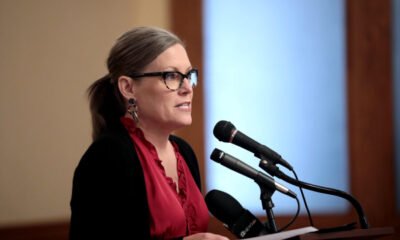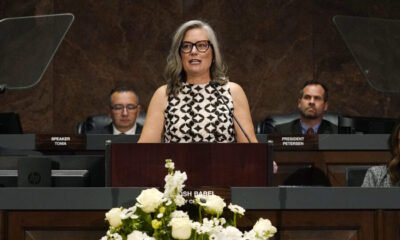Ben Toma
Gov. Hobbs Champions NCAA Final Four’s Economic Windfall

Arizona’s recent hosting of the Men’s Final Four in April generated an impressive economic impact of $429 million, as reported on Tuesday.
However, Governor Katie Hobbs expressed deep concerns that this might be Arizona’s last opportunity to host such a prestigious national sporting event if voters pass the “Border Security Act” proposed by Republicans.
Proposition 314 seeks to empower state and local law enforcement to arrest individuals entering the country outside designated ports. Additionally, it introduces criminal penalties for utilizing false documentation to acquire public benefits or jobs.
The proposition also mandates a presumptive 10-year prison sentence for those selling fentanyl that results in another person’s death.
Governor Hobbs questioned the efficacy of the proposal, asserting that it does not address the root issues of illegal border crossings. She argued that congressional action is necessary, suggesting that bipartisan support for border legislation is lacking among Republicans.
The report detailing the economic impact of the Final Four also raises concerns regarding the potential repercussions of Prop 314 on Arizona’s economy.
“This will put Arizona in the worst negative spotlight nationally,” the governor warned.
Her apprehensions are well-founded; after the approval of SB 1070 in 2010, Arizona lost numerous conventions and conferences. Although parts of that law were later overturned by the U.S. Supreme Court, the provision allowing police inquiries about immigration status remains in effect.
In recent history, the NCAA stripped North Carolina of its ability to host championship events in response to local legislation on transgender rights, a decision reversed only after the law’s repeal in 2017.
Arizona is poised for future NCAA events, including the Women’s Final Four in 2026, which could be jeopardized by Prop 314.
The governor highlighted that this year’s economic contribution exceeds $100 million compared to Arizona’s last hosting in 2017.
The Seidman Research Institute at Arizona State University estimated that nearly 115,000 out-of-state visitors attended the tournament, contributing significantly to the local economy.
Visitors averaged 3.9 nights in Arizona, spending about $482 per person per day, underscoring the event’s financial benefits.
Hobbs emphasized that such events elevate Arizona’s standing nationally, contrasting sharply with the potential damage from Prop 314.
Her comments sparked a fierce rebuttal from House Speaker Ben Toma, the bill’s sponsor, who characterized her statements as “absurd and indefensible.”
Toma framed Proposition 314 as a necessary response to frustrations with the federal administration’s border policies.
“Proposition 314 presents voters with meaningful, commonsense reforms that will help protect our communities,” Toma argued, challenging the governor to support the efforts rather than resorting to alarmist rhetoric.
The ensuing campaign is expected to be contentious and highly visible.
Earlier this year, state lawmakers approved a portion of the measure, granting police the authority to arrest border crossers, though it was vetoed by Hobbs.
“I understand the frustration of Arizonans regarding the federal government’s actions, but that bill is not the solution,” Hobbs stated at that time.
Undeterred, Toma reintroduced the measure as a ballot initiative, circumventing a gubernatorial veto.
Provisions concerning public benefits and employment were added, along with harsher penalties for fentanyl sales.
The ballot measure advanced with minimal support from the Republican-controlled legislature, reflecting strong partisan divisions.
Opposition has emerged from various business interests, recalling the damage inflicted by SB 1070.
James O’Neill from the American Business Immigration Coalition noted the lasting reputational harm caused by previous legislation.
Several local chambers of commerce have formally opposed the measure, though the Arizona Chamber of Commerce remains neutral, citing concerns over unintended consequences from a constitutional amendment.
The chamber plans to avoid taking an official stance on the ballot initiative.






![Members of the Arizona House of Representatives vote during a third reading of nearly three dozen bills at the Arizona State Capitol on March 4, 2025. [Monica D. Spencer]](https://arizonanews.org/wp-content/uploads/2025/06/SR-347-Secures-53M-in-Third-State-Budget-Draft-Awaiting-400x240.jpg)
![Members of the Arizona House of Representatives vote during a third reading of nearly three dozen bills at the Arizona State Capitol on March 4, 2025. [Monica D. Spencer]](https://arizonanews.org/wp-content/uploads/2025/06/SR-347-Secures-53M-in-Third-State-Budget-Draft-Awaiting-80x80.jpg)










